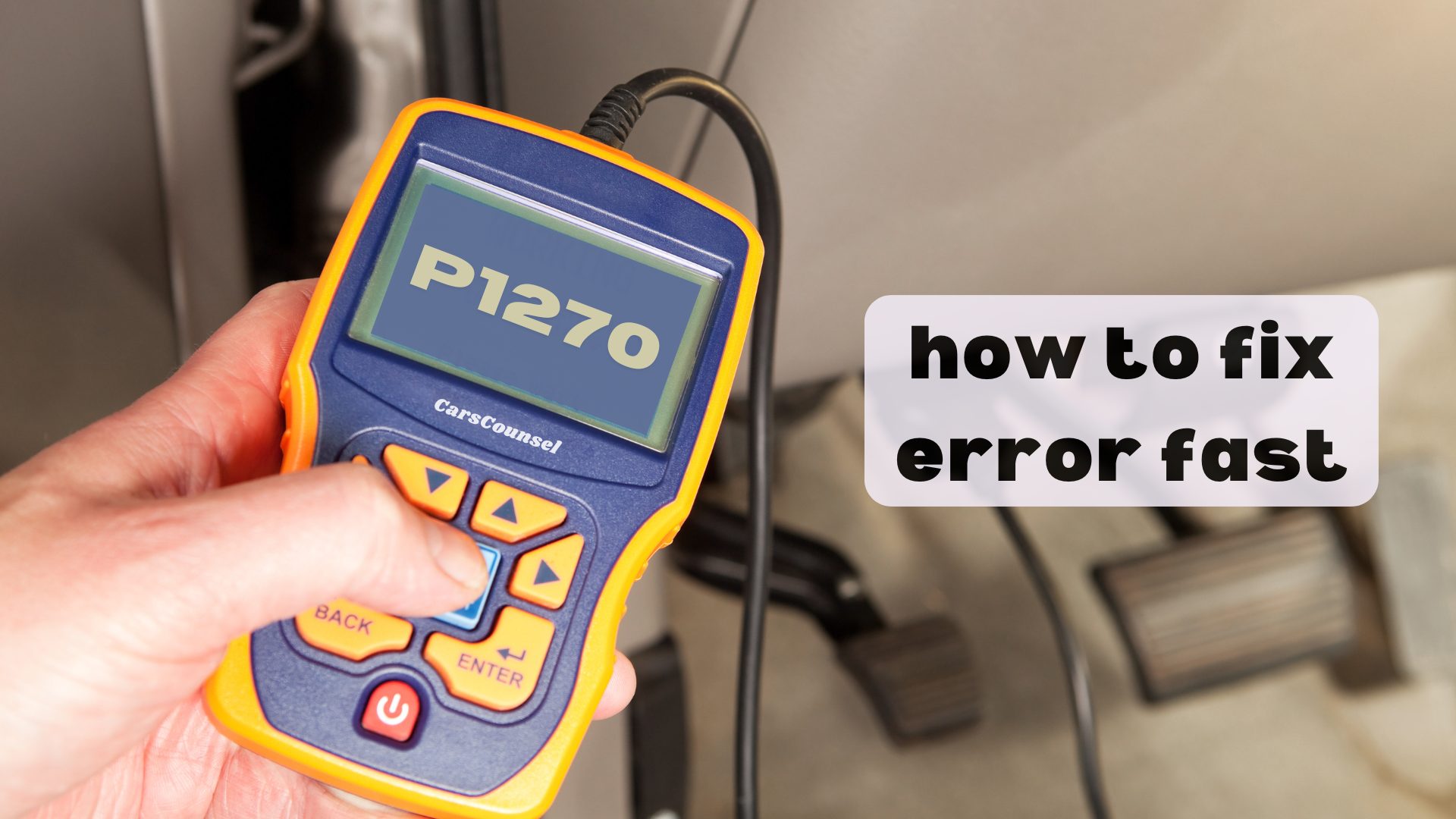When your car’s Check Engine Light comes on and the code P1270 appears, it’s a signal that your engine is being restricted to prevent damage. But what’s causing this restriction? Is it a faulty sensor, a dirty air filter, or something more serious?
The truth is, this code doesn’t give you a clear answer, leaving you wondering what’s going on under the hood. You’re likely experiencing symptoms like RPM fluctuations or loss of power, but to get to the bottom of the issue, you’ll need to dig deeper. The question is, are you ready to uncover the root cause and get your car running smoothly again?

Quick Navigation
Key Takeaways
- The P1270 code is triggered when the engine RPM or speed limiter is reached, restricting engine performance to prevent damage.
- This code is a warning sign that something needs attention, but it doesn’t pinpoint a specific problem.
- Faulty throttle position sensors, dirty air filters, fuel system issues, and mechanical engine problems are common causes of the P1270 code.
- Symptoms of the P1270 code include RPM fluctuations, loss of power, engine misfires, and the Check Engine Light illuminating.
- To diagnose the root cause, retrieve trouble codes, inspect engine logs, and check components such as the throttle position sensor and air filter.
Code P1270 Description and Meaning
Reaching the engine RPM or speed limiter triggers the diagnostic trouble code P1270, which indicates that the engine control module (ECM) has detected engine speed exceeding the manufacturer-set limit.
This trouble code is a warning sign that your engine performance is being restricted to prevent damage. You’ve likely reached the RPM limitations set by the manufacturer to guarantee safe engine operation.
When the ECM detects engine speed exceeding this limit, it triggers the P1270 code to alert you to potential issues. This code doesn’t pinpoint a specific problem, but it’s a signal that something needs attention to prevent engine damage or decreased performance.
Common Causes of the P1270 Code
As you investigate the P1270 code, it’s clear that your engine’s performance is being restricted to prevent damage. This restriction is likely due to one of several common causes. Take a closer look at the following possible culprits:
| Cause | Description |
|---|---|
| Faulty throttle position sensor | Incorrect throttle position data sent to ECM |
| Dirty or clogged air filter | Reduced airflow, leading to engine performance issues |
| Fuel system issues | Fuel pump issues, clogged fuel filter, or failing fuel injectors |
| Malfunctioning ECM | Engine control module not functioning correctly |
| Mechanical engine issues | Timing belt problems, malfunctioning exhaust system, or engine wear |
These causes can lead to engine performance restrictions, and identifying the specific issue is vital to resolving the problem.
Identifying P1270 Symptoms
When your engine’s performance is restricted due to the P1270 code, you’ll likely notice some telltale signs.
As the engine control module (ECM) limits engine speed, you may experience RPM fluctuations, impacting your vehicle’s overall engine performance.
- You might notice a loss of power or acceleration, making it difficult to merge onto highways or climb steep inclines.
- Engine misfires or stalling may occur, especially when driving uphill or carrying heavy loads.
- The Check Engine Light will likely illuminate, indicating a problem that needs attention.
These symptoms can be frustrating, but identifying them is the first step in resolving the underlying issue.
Diagnosing the Root Cause
Pinpointing the root cause of the P1270 code requires a systematic approach to diagnosis. You’ll need to connect a scan tool to the OBD-II port to access engine logs and retrieve trouble codes. Reviewing the engine logs will help you identify patterns or anomalies that can lead you to the root cause.
| Diagnostic Step | Action |
|---|---|
| Retrieve trouble codes | Use a scan tool to access engine logs |
| Review engine logs | Look for patterns or anomalies in engine speed, throttle position, and fuel injection |
| Inspect throttle position sensor | Check for proper operation and cleanliness |
| Check air filter condition | Inspect for dirt or clogging |
| Review fuel system components | Inspect fuel injectors, fuel filter, and fuel pump for proper operation |
Repair and Replacement Steps
What specific repairs will you need to make to get your engine running smoothly again?
To resolve the P1270 code, you’ll need to address the underlying issue.
- Inspect and replace the throttle position sensor if faulty
- Check and replace the air filter if dirty or clogged
- Repair or replace malfunctioning engine components, such as fuel injectors or the exhaust system
Estimated Cost of Repairs
Now that you’ve identified the repairs needed to address the P1270 code, it’s time to estimate the cost of getting your engine running smoothly again.
Your repair estimates will depend on several cost factors, including the type of repairs required, the cost of replacement parts, and labor costs.
On average, you can expect to pay between $200 and $1000 or more, depending on the complexity of the repairs. For example, replacing a faulty throttle position sensor may cost around $100 to $500, while repairing or replacing malfunctioning engine components can range from $500 to $1000 or more.
Be sure to consult a qualified mechanic for an accurate estimate of the repairs and to get a clear understanding of the cost factors involved.
Importance of Professional Diagnosis
When dealing with a complex issue like the P1270 code, it’s essential to have a professional mechanic perform a thorough diagnosis to identify the root cause of the problem.
This code is triggered when the engine control module detects engine speed exceeding the manufacturer-set limit, which can be caused by various factors such as aggressive driving, engine control system malfunction, or engine component issues.
- Accurate diagnosis is vital to prevent misdiagnosis and unnecessary repairs.
- A professional mechanic has the expertise to interpret the data from the diagnostic scanner and perform RPM monitoring to identify the root cause.
- They can also help you understand the speed limitations of your vehicle and provide guidance on how to prevent similar issues in the future.
Additional Resources for Repair
Beyond the repair steps outlined above, you’ll want to consult additional resources to guarantee a comprehensive fix for the P1270 code.
For a detailed, step-by-step guide, consult a repair manual specific to your vehicle’s make and model. These resources provide in-depth information on diagnosing and repairing engine-related issues, including the P1270 code.
You can also join online forums dedicated to your vehicle’s make, where you can connect with other owners who’ve experienced similar issues. These forums often provide valuable insights, tips, and advice from experienced mechanics and DIY enthusiasts.
More OBD-II Codes
| P1269 | P1268 | P1267 | P1266 |
| P1265 | P1264 | P1263 | P1262 |
| P1261 | P1260 | P1259 | P1255 |
| P1256 | P1257 | P1258 | P1254 |
| P1253 | P1252 | P1251 | P1116 |
| P1115 | P1114 | P1111 | P1112 |
Conclusion
When code P1270 appears, don’t bury your head in the sand – address the issue promptly, as the saying goes. Ignoring it can lead to further damage and more costly repairs down the road. By understanding the code’s meaning, identifying symptoms, and diagnosing the root cause, you can take control of the situation and get your engine running smoothly again. Remember, an ounce of prevention is worth a pound of cure, so don’t wait until it’s too late.

